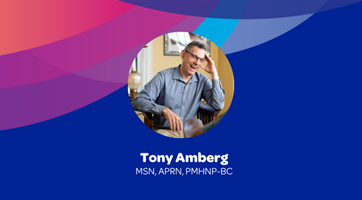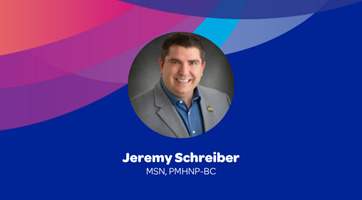Nurse Practitioner Spotlight
A career as a nurse practitioner can be replete with challenges and opportunities. The NP Psych Navigator Spotlight is your chance to learn more about NPs who are working to advance the profession and psychiatric mental health in general. In this installment of the series, we profile Tony Amberg, MSN, APRN, PMHNP-BC.
NP Spotlight: Alan “Tony” Amberg, MSN, APRN, PMHNP-BC
In this NP Psych Navigator Spotlight, we meet Tony Amberg, MSN, APRN, PMHNP-BC, who started a career in theatre, media, and radio, then migrated to healthcare and became a psychiatric nurse practitioner at the age of 50.
As a young adult, Tony Amberg knew the transformative impact of the stories we hear, tell, and live, expressing “the human story can heal, inform, and inspire.” Amberg also recalls he knew serious depression and anxiety as early as the second grade and remembers, “Nobody talked about this back then.” Amberg began to receive help in high school and found himself torn between pursuing ambitions in theatre and psychotherapy.
Amberg decided initially to pursue media and the arts, where he found success and an opportunity to build a professional theatre in Washington, DC. He then moved to Chicago and entered the world of marketing, public relations, and sales. After his partner passed away of AIDS in 1991, Amberg established a groundbreaking Chicago talk radio show geared to the LGBTQ+ community. For 7 years, it featured a variety of guests and gave their stories a powerful platform – highlighting unique human experiences and sharing a multitude of healing stories from people who were flipping old scripts to change the world. “I loved the human story and the impact of sharing these stories. This was healing work, and I was enthusiastic about how sharing these stories could help people,” Amberg says. “My father was a journalist, and I was following his path to change the world.”
Amberg’s path in radio took him into the health care world. “We did the first on-air tests for HIV and breast self-examination. We covered LGBTQ+ mental health and spirituality. We talked about domestic violence and addiction,” he highlighted, noting how this work led his company to receive grants to produce CME materials. By 2001, Amberg found his path squarely in healthcare – mostly in the HIV world – developing provider and patient education about HIV, the new Medicare D, transplants, and mental health.
After becoming the interim Midwest HIV specialist for a national drug store’s sales team, Amberg decided it was time to go back to school. “At about 10 years into the healthcare profession, I realized that I had come as far as I could as a self-taught person.” Amberg decided that he wanted to be a nurse practitioner, and upon learning that psychiatry was an option, “I said, that’s it. That’s for me.”
Going back to school at age 44 was challenging for Amberg but carried unexpected rewards. “My mother was a psychiatric nurse in one of the nation’s first psychiatric nursing programs in the 1940s. Suddenly, I started to understand who she was and what she did… Every day, I feel close to her. She wanted to be a doctor. If only she could have seen what nurse practitioners do today.”
Lessons Learned
Being able to speak to patients during their treatment was the most meaningful and fulfilling part of the job for Amberg.
“Nursing school clinicals quickly taught me who I was. I was always in trouble with the nurses because I would stop to talk to patients and couldn't get tasks done fast enough. If a patient was crying, that was it, I was in the room with them for 20 or 30 minutes talking about what was wrong,” Amberg explains. “Critical care was interesting, but often the patients were intubated or otherwise unable to speak, and for me, that wasn’t enough. I found that my years on the radio interviewing people, doing focus groups, training patients and providers—and having lived more life— gave me a unique advantage on the floor. Suddenly patients were telling me their life stories and feeling better.”
Amberg most recently worked at Northwestern Memorial Hospital in Chicago doing Consult Psychiatry in the main hospital with a team who routinely saw patients experiencing multiple health crises and emotional burdens, as well as psychiatric illness and/or substance use. Complex cases in Amberg’s purview frequently included those in the intensive care unit with suicidal ideation, transplant patients with depressive symptoms, or patients with cancer experiencing delirium.
In his current private outpatient practice, Amberg is working to build a personalized, more collaborative approach, featuring longer appointment times and offering full integration with other providers on the patient’s treatment team.
“I believe in a truly collaborative approach to address physical, mental, and spiritual health,” says Amberg, “and by working together, we can provide a much higher quality of service.”
“I love helping people meet their vision,” Amberg states. “Helping people feel better is an important beginning – but helping people reach for a life in which they are flying at full wingspan, that's what I live for.”
Resilience Work
Throughout the COVID-19 pandemic, Amberg found himself taking care of the staff, as well as patients, teaching breathing and grounding techniques. A “Psychological First Aid” program that was meant to provide nurses with stress reduction skills expanded to include hundreds of staff groups and 2800 staff members at Northwestern Memorial. This program encompassed several departments across the hospital, including surgical, critical care, phlebotomy, x-ray, and physical therapy units.
The program taught Amberg the importance of stepping back and reframing the situation for hospital staff. “I also learned how important it is to bake wellness and well-being into the institutional structure,” says Amberg. “If the staff is too busy, and the situation is too critical that they cannot stop, then they can't take advantage of wellness activities.”
For this unique work, Northwestern Medicine recognized Amberg as a “Hero for Better,” and he received national media coverage.
Mentorship
In addition to his practice, Amberg serves as a clinical supervisor to nursing students and is the former president of the American Psychiatric Nurses Association (APNA) Illinois Chapter. Amberg faced the question, “What kind of nursing is right for you?” early in his nursing career, and his experiences working across multiple different services helped determine his areas of specialization.
Amberg’s breadth of nursing experience, mentorship, and leadership roles have helped him gain valuable insights to share with nursing students. Now, he has a few key questions for nursing students figuring out their own paths forward:
Do you really like people and their stories? If you do, consider a psychiatric specialization. If you do not want in-depth interpersonal contact, consider surgical RNs, CRNAs, and other roles where there is less contact.
Do you love formulaic and straightforward answers? If you like clear-cut answers, areas that involve regular procedures may be for you.
Do you gravitate toward big messy problems? Psychiatry has the unenviable task of quantifying the human mind, romantic heart, and spirit. Receptors and circuits aside, there is nothing bigger or messier or more endearing than delving into what makes us the best possible humans.
Do you really want to follow a person longitudinally and really have a deep and meaningful relationship with them through their ups and downs? Psychiatry or transplant may be a good fit. If not, then emergency medicine or another specialty may be a better fit.






.jpg)